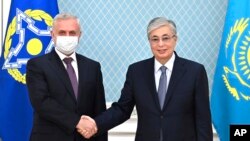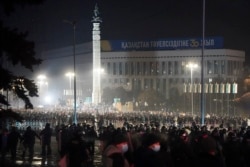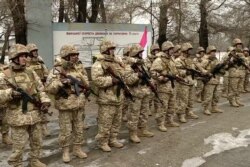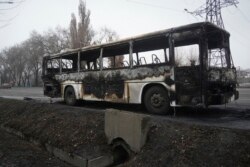Kazakhstan’s political turmoil erupted at precisely the moment the U.S. and Russia began to negotiate deep disagreements over Ukraine, NATO and European security. The deployment of 2,500 “peacekeepers” by the Kremlin-led Collective Security Treaty Organization (CSTO) struck many Washington experts as a shift in Kazakhstan’s foreign policy that strengthens Russia’s hand.
But on January 11, Kazakh President Kassym-Jomart Tokayev, who leads a country that has long claimed to pursue a balanced “multivector” foreign approach, announced that CSTO forces would begin departing as early as this week and should be completely gone by the end of January.
Still, argued the Atlantic Council’s John Herbst, a former U.S. ambassador to Ukraine and Uzbekistan, “President Vladimir Putin’s goal of restoring Russian influence in the post-Soviet space is not limited to Ukraine, Georgia, and Moldova; Tokayev’s invitation gives Moscow the chance to do just that in Central Asia’s richest country.”
Herbst adds that Tokayev had another option for external support — the China-backed Shanghai Cooperation Organization (SCO) — which also includes Russia, but chose the CSTO, showcasing the tilt toward Moscow. Despite growing cooperation in opposing U.S. policies globally, China and Russia, he says, are “competitors” in Central Asia.
Jennifer Murtazashvili, of the University of Pittsburgh and the Carnegie Endowment, says the early departure of the Russian troops changes little “because Tokayev needed Russia to help him win an internal battle” that he claims was an attempted coup. With or without boots on the ground, “the effects of Russian intervention will likely last for a long time.”
“Kazakhstan is beholden to Russia in a way that it wasn't before, limiting the scope of Kazakhstan's multi-vectored foreign policy. So, it is not the length of the Russian deployment, but the fact that Kazakhstan’s leadership needed to call upon outsiders to protect the country that makes it likely to be more responsive and beholden to Russia.”
Anti-government protests erupted in the first days of the new year, gradually turning into violent riots, especially in Kazakhstan’s largest city, Almaty. Tokayev says “foreign-backed terrorists” are behind the deaths of more than 160 people and material damage could be $2-$3 billion, according to the government. About 12,000 have been detained.
Murtazashvili says Kazakhstan had seen sporadic protests since a 2019 reshuffle in which Tokayev replaced Nursultan Nazarbayev, who had led the country since 1989.
“These events came on the heels of the 10th anniversary of a massacre in western Kazakhstan, where more than a dozen oil workers died. A painful increase in gas prices triggered a lot of indignation about history and the government.”
Murtazashvili argues that protests started locally. “Different protesters in different parts of the country had different grievances focused on local governance. Tokayev had promised local governance reforms but never delivered.”
She is among many researchers who simply do not accept Tokayev’s statements about “terrorists” being at the root of the protests. “Because it's the same explanation that we see immediately after every other instance of unrest” in Kazakhstan and other authoritarian countries, whose regimes try to justify their use of force.
Kazakhstan is a police state with a powerful security apparatus, Murtazashvili adds, so it is simply unbelievable that “20,000 extremists” could have carried out such an operation.
William Courtney, former U.S. ambassador to Kazakhstan, says the longer-term U.S. interest in a peaceful, stable, more open and pluralistic Kazakhstan will endure. It is also in America’s interest, he said, “that Russia does not perceive an opportunity for imperialistic adventures.”
Murtazashvili diverges from Herbst’s assessment of Russia-China competition in the region, seeing instead a “division of labor” where Russia dominates security, while China builds and finances infrastructure. “This gives Central Asians a great deal of autonomy as they engage with Russia and China.”
She does not see Central Asian countries as pawns of great powers. “What we've seen over the past several years is these Central Asian countries actually embrace this rivalry and take advantage of it.”
The Biden administration’s response to the bloody events in Kazakhstan has been largely limited to calls for calm. But Courtney cautions the U.S. needs to be careful about what it says when events are moving quickly.
“We've had 30 years of really good relations with Kazakhstan, which took an enormous number of positive steps in the international community, from nonproliferation to hosting Syria talks. … Our relationship with Kazakhstan has a lot more political capital left in it,” he says.
Indeed, the oil-rich country boasts America’s largest direct investments in the region. For years, both Republican and Democratic administrations hailed Kazakhstan as a leader and reliable strategic partner.
On Monday, Kazakhstan’s National Day of Mourning, the State Department expressed condolences to America’s “trusted friend.” “We believe in the resilience of Kazakhstan’s people and their capacity to rebound from this crisis,” it tweeted.
In a call with Foreign Minister Mukhtar Tileuberdi on January 6, Secretary of State Antony Blinken reiterated Washington’s “full support for Kazakhstan’s constitutional institutions and media freedom and advocated for a peaceful, rights-respecting resolution to the crisis.”
The State Department also condemned violence and destruction of property in Kazakhstan, calling for restraint by both authorities and protesters, urging all parties to find a peaceful resolution.
Murtazashvili agrees the U.S. has much at stake but harbors doubt about its influence in the region following its precipitous withdrawal from Afghanistan. “I think the U.S. should take a very careful look at its strategy toward Central Asia. Does the U.S. have any credible interests in this region now?”
One early debate will be whether the Nazarbayev era is truly over in Kazakhstan. Courtney says the power elite that supported Nazarbayev and his close family people may be gone, but the power structure he established may yet endure.







